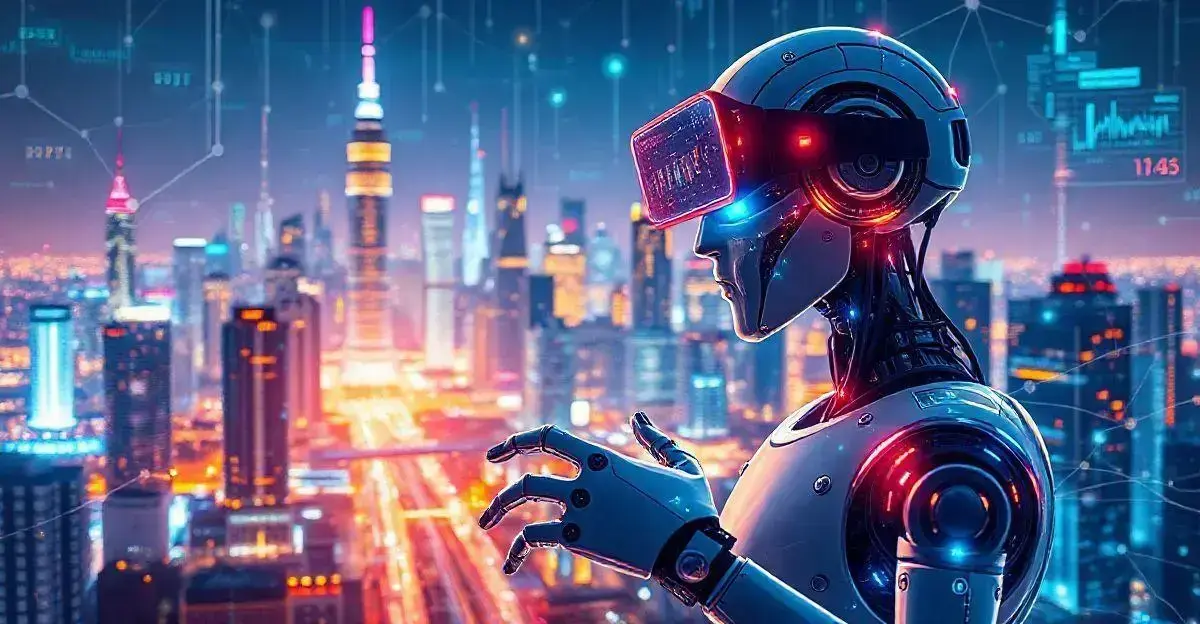The future of artificial intelligence is a topic that captivates many. As technology continuously evolves, the potential applications of AI appear limitless.
Introduction to Artificial Intelligence
Artificial Intelligence (AI) refers to the ability of machines to mimic human cognitive functions. It encompasses a wide range of technologies, including machine learning, natural language processing, and computer vision. These technologies allow machines to learn from data, understand human languages, and interpret visual information, laying the foundation for the future of Artificial Intelligence.
The origins of AI can be traced back to the 1950s when researchers began exploring the idea of machines that could think. Today, AI plays an integral role in our daily lives, from virtual assistants like Siri and Alexa to recommendation systems on streaming platforms. These advancements highlight the growing importance of AI as we move toward a more interconnected and automated world.
As we progress technologically, embracing AI is essential for shaping the future of Artificial Intelligence. Businesses leveraging AI can automate routine tasks, improve decision-making, and enhance customer experiences.
Understanding the fundamentals of AI is the first step in unlocking its potential for personal and professional growth, ensuring we adapt to its transformative impact effectively.
Current Trends in AI Development

Current Trends in Artificial Intelligence (AI) highlight the rapid evolution of this transformative technology. Businesses are increasingly leveraging AI solutions to enhance efficiency and drive innovation.
Key advancements include machine learning, enabling systems to learn from data, and natural language processing (NLP), allowing machines to understand and respond to human language effectively.
A notable trend is the rise of automated decision-making. Companies are employing AI algorithms to evaluate risks and make swift decisions, significantly boosting productivity. Another critical development is the focus on AI ethics, emphasizing fairness, accountability, and transparency in AI systems to ensure responsible use.
The integration of AI with Internet of Things (IoT) devices is reshaping industries. Smart devices equipped with AI collect and analyze data, making automated adjustments without human input. This trend is particularly impactful in healthcare, where AI enhances patient care by predicting needs and improving outcomes.
In summary, the current trends in AI development showcase a field brimming with potential. By staying informed about these advancements, individuals and businesses can effectively harness AI’s power to innovate and thrive in a rapidly changing world.
Predictions for AI in the Next Decade
AI integration into everyday life is poised to enhance various sectors, including healthcare, business, and education. Its transformative potential will reshape how we live and work.
In healthcare, AI is revolutionizing the field with faster, more accurate disease diagnoses and predictive capabilities. Advanced algorithms analyze patient data to foresee medical issues, while robotic assistance in surgeries promises increased precision and faster recovery times.
In business, AI will redefine decision-making processes, enabling companies to forecast market trends with advanced analytics. Chatbots will become integral to customer service, offering 24/7 support and personalized interactions that improve user experiences.
In education, AI is set to create tailored learning experiences. AI-driven platforms will adapt to individual learning styles, providing personalized teaching methods to enhance student outcomes.
However, the widespread adoption of AI also raises ethical concerns. Issues around privacy, security, and algorithmic bias will demand responsible regulations and transparent practices to ensure fairness and accountability.
As AI continues to evolve, its integration will shape a future marked by innovation, efficiency, and thoughtful consideration of its societal impact.
The Role of Machine Learning in AI’s Future

Machine learning is a critical component of the future of Artificial Intelligence (AI). It allows systems to learn from data, improving their performance without explicit programming. This technology enables computers to identify patterns and make decisions based on past experiences. As machine learning techniques evolve, they can process larger datasets swiftly, enhancing their predictive capabilities.
One significant advancement is deep learning, a subset of machine learning that emulates the human brain’s neural networks. This approach is instrumental in developing self-driving cars, facial recognition systems, and other complex AI applications. Deep learning allows machines to learn from vast amounts of unstructured data, significantly improving accuracy and efficiency.
Furthermore, machine learning will play a vital role in personalised experiences. Companies can analyse customer data to predict individual preferences and tailor services accordingly. This personalisation enhances user satisfaction and fosters customer loyalty.
As we look to the future, the importance of machine learning in AI’s growth cannot be overstated. With ongoing research and development, we can expect even more efficient and sophisticated AI systems that can tackle real-world challenges effectively.
Impact of AI on Employment and Jobs
The impact of Artificial Intelligence (AI) on employment and jobs is both significant and multifaceted. While concerns about job displacement due to AI’s efficiency and speed are valid, it is crucial to recognize that AI also generates new opportunities.
Roles in AI development, maintenance, and management are increasingly in demand, creating a growing need for skilled professionals, shaping the future of Artificial Intelligence.
Industries like manufacturing, healthcare, and finance are experiencing profound transformations driven by AI. In manufacturing, robots handle repetitive tasks, allowing workers to focus on more complex and rewarding responsibilities.
In healthcare, AI assists in diagnosing diseases, enabling medical professionals to deliver better patient care and outcomes. These advancements are key to the expanding future of Artificial Intelligence across sectors.
AI is also reshaping how we work. Remote working environments benefit from AI tools that facilitate collaboration and boost productivity. Additionally, AI can analyze worker performance, providing managers with valuable insights for training and development.
While job displacement is inevitable, adapting to new skill requirements through lifelong learning will be essential. By embracing change, individuals can thrive in a workplace increasingly influenced by AI.
Ethical Considerations in AI Advancements

Ethical Considerations in AI Advancements are becoming increasingly critical as AI continues to shape various aspects of our lives. One major concern is privacy. AI systems often rely on vast amounts of personal data to function effectively.
Without proper safeguards, this can lead to misuse or breaches of sensitive information. Organizations must implement robust data protection measures and ensure transparency in how data is collected, stored, and used.
Another pressing issue is bias and fairness in AI algorithms. Since AI systems learn from historical data, they can inadvertently inherit biases present in the datasets. This can result in discriminatory outcomes, particularly in areas like hiring, law enforcement, and lending.
Developers must prioritize fairness by carefully auditing datasets and designing algorithms that mitigate bias, ensuring AI serves all individuals equitably.
Lastly, the question of accountability arises as AI systems become more autonomous. When AI makes decisions, it can be challenging to determine who is responsible for errors or unintended consequences. Clear frameworks are needed to assign accountability, whether it lies with developers, operators, or the organizations deploying AI.
Addressing these ethical considerations is essential to ensure AI advancements are both innovative and responsible, benefiting society as a whole.
AI in Healthcare: What to Expect
The role of Artificial Intelligence (AI) in healthcare is rapidly evolving, promising significant advancements in patient care and treatment outcomes. AI can assist in diagnosing diseases with increased accuracy by analysing medical images and patient data.
Machine learning algorithms can identify patterns that human eyes might miss, enabling early detection of conditions such as cancer or cardiovascular diseases.
AI will also transform the way healthcare is delivered. For instance, virtual health assistants can provide real-time support to patients, helping them manage their health from home. These AI-driven tools can answer questions, monitor symptoms, and remind patients of medication schedules.
Moreover, predictive analytics powered by AI can improve hospital operations. By analysing data on patient admissions, healthcare facilities can anticipate demand, manage resources effectively, and reduce waiting times for treatments.
As we move forward, it is important to embrace these technologies while addressing concerns such as data privacy and the need for ethical standards in AI applications. The future of Artificial Intelligence in healthcare holds great promise, paving the way for more personalised and efficient care for patients.
The Future of Artificial Intelligence in Daily Life

The future of Artificial Intelligence (AI) in daily life is bright, transforming how we interact with technology. AI will become more integrated into our everyday routines, making tasks easier and more efficient. For instance, smart home devices powered by AI can learn user preferences to automate lighting, temperature, and even security systems.
Additionally, AI is set to revolutionise how we shop. Online retailers will provide personalised recommendations based on purchase history and browsing habits, enhancing the overall shopping experience. AI chatbots will assist customers with queries around the clock, improving service quality.
In transportation, AI will contribute to the development of autonomous vehicles. These self-driving cars promise to reduce traffic accidents and improve travel efficiency. Navigation systems using AI will optimise routes in real time, saving time and fuel.
Furthermore, AI applications in healthcare will facilitate better health monitoring and management. Wearable devices will track vital signs and predict health issues, prompting timely interventions.
As AI continues to evolve, its presence in our daily lives will grow, making tasks simpler and enhancing our quality of life.
Embracing the Future of Artificial Intelligence
The future of Artificial Intelligence (AI) promises exciting advancements and opportunities.
As AI continues to evolve, its influence on various sectors will expand, significantly improving efficiency, productivity, and personalisation in our daily lives.
It is crucial to approach AI implementation thoughtfully, focusing on ethical considerations and ensuring that all individuals can benefit from the technology.
With the right strategies, businesses and individuals alike can harness the power of AI to drive innovation and growth.
Ultimately, embracing AI is not just about adopting new technologies; it is about shaping a smarter, more connected future for everyone.
Check out our article on AI in Healthcare to learn how artificial intelligence is revolutionizing medical practices and improving patient care.
